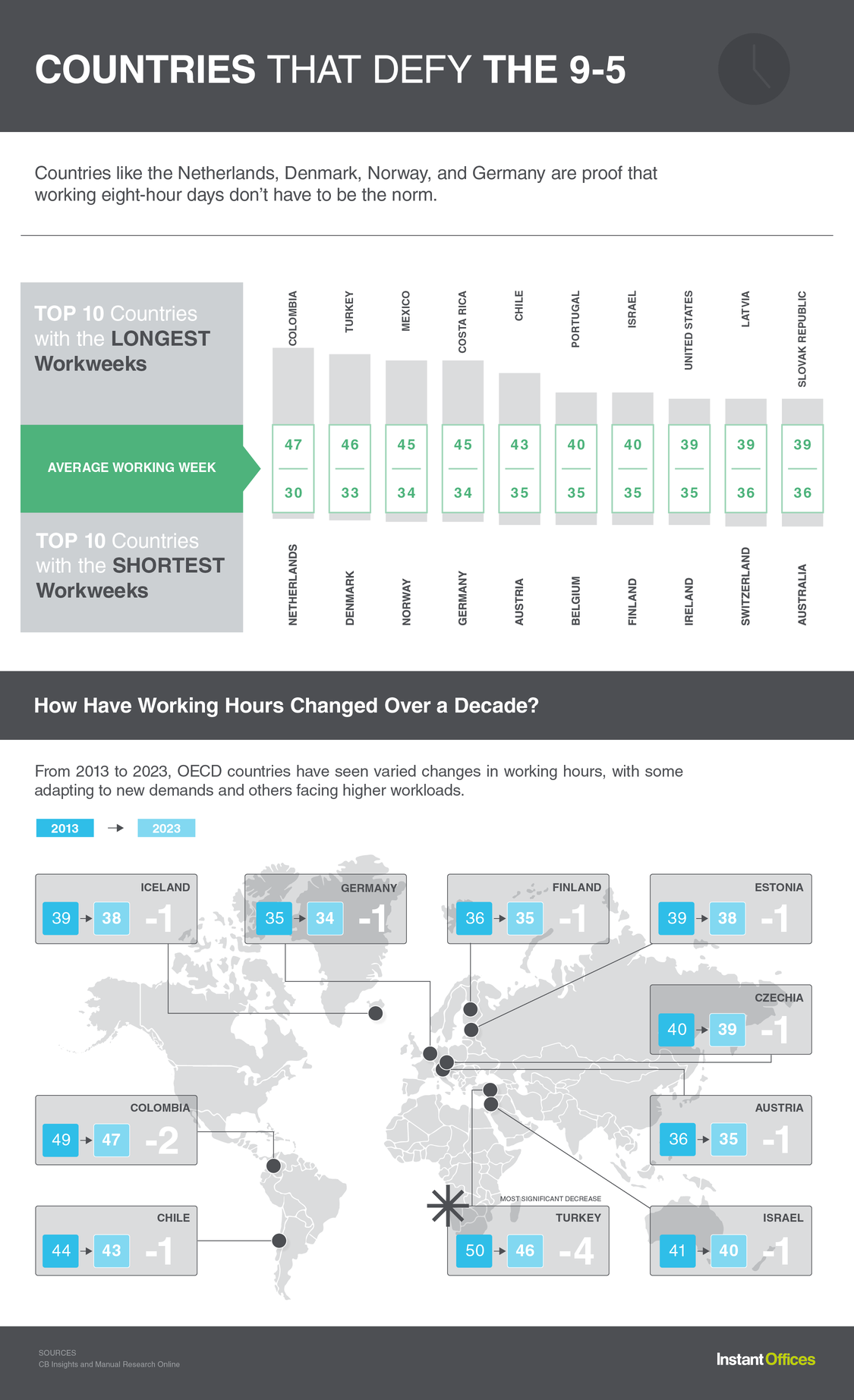Countries like the Netherlands, Denmark, Norway, and Germany are proof that working eight-hour days don’t have to be the norm. Globally, the average work week is around 37 hours, but in some places, this ranges from below 40 to almost 50 hours.
Many high-income countries are experiencing a growing trend towards shorter workweeks, fueled by a strong focus on work-life balance and employee wellbeing. In 2024, conversations around four-day work weeks and flexible schedules are gaining traction.
On the flip side, many developing countries still have much longer workweeks, often exceeding 48 hours, as economic pressures and limited worker protections push people to work harder.
(click/tap to enlarge)
Top 10 countries with the longest workweeks
| Country | Average Working Week |
|---|---|
| Colombia | 47 |
| Turkey | 46 |
| Mexico | 45 |
| Costa Rica | 45 |
| Chile | 43 |
| Portugal | 40 |
| Israel | 40 |
| United States | 39 |
| Latvia | 39 |
| Slovak Republic | 39 |
There is a massive contrast in workweek lengths across countries, with Colombia, Turkey, and Mexico topping the list. Colombia’s average workweek of 47 hours is notably longer than the OECD average, showcasing an intense work culture, along with Turkey and Mexico, with 46 and 45 hours, respectively.
Within the OECD, there’s a significant range, with countries like Chile, Portugal, and the United States having more moderate but still lengthy workweeks than others.
Colombia leads with an average workweek of 47 hours
Colombia has a demanding work culture where employees face the highest average workweek among OECD countries. There are several reasons for this, including economic pressures and societal norms prioritising long working hours as a measure of productivity. Despite recent legal efforts to reduce the maximum workweek to 42 hours, the transition is gradual and ongoing.
Turkey comes in second with an average workweek of 46 hours
Turkey’s maximum legal working week is 45 hours; however, employees often exceed their hours due to economic pressures and workplace expectations, reflecting a demanding work culture.
Mexico ranks third with a 45-hour workweek
Like many countries, Mexico’s workplace culture normalises long hours. To offset this, Mexico offers a robust vacation policy, aiming to balance the intense work environment, and discussions are ongoing about reducing the workweek to 40 hours.
Top 10 countries with the shortest Workweeks
| Country | Average working week |
|---|---|
| Netherlands | 30 |
| Denmark | 33 |
| Norway | 34 |
| Germany | 34 |
| Austria | 35 |
| Belgium | 35 |
| Finland | 35 |
| Ireland | 35 |
| Switzerland | 36 |
| Australia | 36 |
Against the OECD average of 37 hours, European countries like the Netherlands, Denmark, and Norway have the shortest average work weeks, with 30, 33, and 34 hours respectively.
While nations like Colombia have much longer work weeks, the focus on shorter hours in some European countries may reflect cultural priorities on work-life balance, employment rights, or economic structures that support higher productivity with fewer hours.
The Netherlands stands out with the shortest working week
Averaging 30 hours a week, the reduced work schedule in the Netherlands is often attributed to the country’s strong emphasis on part-time work and flexible working arrangements. The Dutch labor market boasts a high degree of job satisfaction and work-life balance, which is supported by policies that encourage both men and women to participate in the workforce while maintaining family and leisure time.
Denmark follows closely with an average workweek of 33 hours
The Danish model is renowned for its “flexicurity” system, which combines labor market flexibility with social security. This allows employees to enjoy shorter working hours without sacrificing economic stability.
Norway is third on the list, with an average workweek of 34 hours
Norway’s focus on gender equality and family-friendly policies supports reduced working hours, enabling both parents to participate actively in childcare and household responsibilities.
Full List
| Country | Average working week |
|---|---|
| Netherlands | 30 |
| Denmark | 33 |
| Norway | 34 |
| Germany | 34 |
| Austria | 35 |
| Belgium | 35 |
| Finland | 35 |
| Ireland | 35 |
| Switzerland | 36 |
| Australia | 36 |
| Italy | 36 |
| France | 36 |
| Spain | 37 |
| United Kingdom | 37 |
| OECD Average | 37 |
| Sweden | 37 |
| Estonia | 38 |
| Iceland | 38 |
| New Zealand | 38 |
| Luxembourg | 38 |
| United States | 39 |
| Latvia | 39 |
| Slovak Republic | 39 |
| Greece | 39 |
| Czechia | 39 |
| Lithuania | 39 |
| Slovenia | 39 |
| Hungary | 39 |
| Poland | 39 |
| Portugal | 40 |
| Israel | 40 |
| Chile | 43 |
| Mexico | 45 |
| Costa Rica | 45 |
| Turkey | 46 |
| Colombia | 47 |
How have working hours changed over a decade?
Between 2013 and 2023, average working hours in some OECD countries have shifted, with some nations adapting to modern work demands while others grapple with intensifying workloads.
Of the 37 countries analysed, 12 reduced their workweek by an hour or more in the last decade, 14 remained the same, and 10 increased their workweeks by an hour.
Turkey has seen the most significant decrease, with the average workweek dropping from 50 to 46 hours. Colombia, Germany, Iceland, and Israel have also improved.
France, Italy, Norway, and Spain have maintained their working hours over the last decade, while the UK, US, Switzerland, Sweden, and others have all seen increases.
| Country | 2013 | 2023 | Increase/Decrease |
|---|---|---|---|
| Turkey | 50 | 46 | -4 |
| Colombia | 49 | 47 | -2 |
| Austria | 36 | 35 | -1 |
| Chile | 44 | 43 | -1 |
| Czechia | 40 | 39 | -1 |
| Estonia | 39 | 38 | -1 |
| Finland | 36 | 35 | -1 |
| Germany | 35 | 34 | -1 |
| Iceland | 39 | 38 | -1 |
| Israel | 41 | 40 | -1 |
| Poland | 40 | 39 | -1 |
| Slovak Republic | 40 | 39 | -1 |
| Australia | 36 | 36 | 0 |
| Belgium | 35 | 35 | 0 |
| Canada | 0 | 0 | 0 |
| Denmark | 33 | 33 | 0 |
| France | 36 | 36 | 0 |
| Greece | 39 | 39 | 0 |
| Hungary | 39 | 39 | 0 |
| Italy | 36 | 36 | 0 |
| Latvia | 39 | 39 | 0 |
| Mexico | 45 | 45 | 0 |
| Norway | 34 | 34 | 0 |
| Portugal | 40 | 40 | 0 |
| Slovenia | 39 | 39 | 0 |
| Spain | 37 | 37 | 0 |
| Global Average | 37 | 37 | 0 |
| Costa Rica | 44 | 45 | +1 |
| Ireland | 34 | 35 | +1 |
| Lithuania | 38 | 39 | +1 |
| Luxembourg | 37 | 38 | +1 |
| Netherlands | 29 | 30 | +1 |
| New Zealand | 37 | 38 | +1 |
| Sweden | 36 | 37 | +1 |
| Switzerland | 35 | 36 | +1 |
| United Kingdom | 36 | 37 | +1 |
| United States | 38 | 39 | +1 |
The landscape of working hours across OECD countries illustrates a stark contrast in global work culture, driven by varying economic pressures, cultural norms, and labour market policies.
While some countries maintain longer workweeks, others are progressively moving towards shorter ones, reflecting a growing emphasis on flexible working arrangements, work-life balance, and employee wellbeing. As discussions around four-day work weeks and flexible schedules gain momentum, the future of work will likely evolve in favour of greater balance and productivity.
This shift enhances individual wellbeing and paves the way for a more sustainable and fulfilling work environment globally.
Looking for Office Space?
We Operate in Some of the World’s Top Cities:
London, New York, San Francisco, Paris, Singapore, Hong Kong, Search more locations

